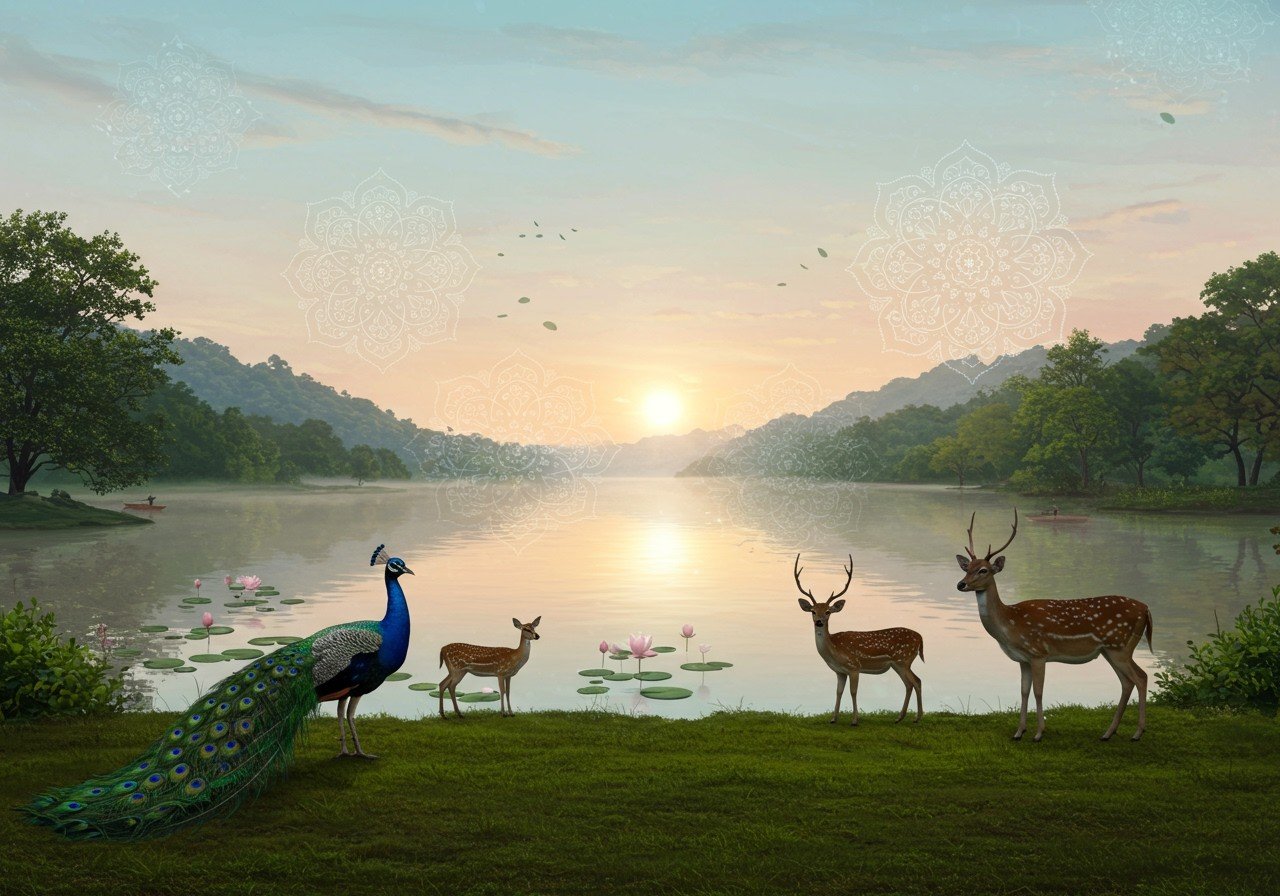
Udaipur, the “City of Lakes,” nestled amidst the Aravalli Range, is a harmonious blend of natural beauty and rich cultural heritage. Local communities play a vital role in preserving the forests, holding ancient traditions of worshipping deities like Kesariyaji and taking pledges to protect the trees. Udaipur and its surrounding areas are blessed with several wildlife sanctuaries, offering nature enthusiasts a chance to connect with diverse flora and fauna in their natural habitats.
Sacred Groves: Nature’s Divine Abodes
In Udaipur, sacred groves stand as tranquil havens of spirituality. Ancient banyan and peepal trees, revered as the dwelling places of gods and spirits, are integral to religious ceremonies. Preserving these groves is considered a sacred responsibility, a practice deeply rooted in the concept of sacred ecology.
Even as modernization touches our lives, community initiatives strive to protect these natural sanctuaries. The local deities, intrinsically linked to these sites, enrich the cultural tapestry of the region. Spiritual seekers are drawn to these hallowed spaces, finding solace and a divine connection.
Wildlife: Emblems of Cultural Reverence
Udaipur’s wildlife sanctuaries are home to creatures imbued with deep cultural meaning. Animals like the peacock, associated with Lord Kartikeya, grace local narratives and festivals. The principle of ‘Ahimsa,’ non-violence, is the guiding light for wildlife conservation in this region.
Traditional practices foster a harmonious coexistence with wildlife, built on respect and reverence. Community-led initiatives work tirelessly to protect these habitats, balancing the needs of tradition with the demands of modern life. In Udaipur, the animal kingdom is not merely a part of the landscape; it is an integral thread in the fabric of daily life.
Notable Wildlife Sanctuaries Near Udaipur
- Sajjangarh Wildlife Sanctuary: Located near the majestic Sajjangarh Palace, this sanctuary spans 5.19 square kilometers. A haven for a variety of birds, animals, and reptiles, it’s home to blue bulls (Nilgais), jackals, wild boars, hyenas, chitals, panthers, hares, and sambhars. It’s renowned as a prominent bird sanctuary in Udaipur, offering a symphony of avian life.
- Mount Abu Sanctuary: Situated in the Aravalli Range, near the picturesque hill town of Mount Abu, this sanctuary encompasses approximately 290 square kilometers. A biodiversity hotspot, it boasts over 100 plant families and over 250 bird species, including the Grey Jungle Fowl. The sanctuary provides refuge to animals like the jungle cat, Indian wolf, and sloth bear. It is truly a place where nature thrives in all its glory.
- Kumbhalgarh National Park: Located in the Rajsamand region, about 100 kilometers from Udaipur, this park stretches across approximately 578 square kilometers. It is home to majestic leopards, graceful chinkara, and a plethora of bird species. Within the park lies the magnificent Kumbhalgarh Fort, a UNESCO World Heritage Site, adding a touch of history to the natural splendor. The park offers a unique blend of historical and natural wonders.
- Bagdara Nature Park: This hidden gem is a haven for nature lovers seeking a unique experience. Known for its resident crocodiles, it offers a glimpse into a lesser-known side of the region’s wildlife. It’s a perfect spot for those who appreciate the thrill of encountering these fascinating reptiles.
Eco-Spirituality: Harmonizing Exploration and Respect
Eco-spirituality encourages responsible exploration of Udaipur’s natural sanctuaries. Sustainable tourism practices help safeguard the sanctity of sacred groves and wildlife habitats. Knowledgeable local guides provide insights into the cultural and spiritual significance of these areas.
The principle of ‘leave no trace’ underscores the importance of respecting both nature and tradition. Eco-friendly travel options, such as walking trails and cycling routes, minimize our impact on the environment. Participating in local conservation efforts fosters a sense of responsibility and reverence among visitors. Find beautiful Gopal dresses at Poojn.in.
What are sacred groves, and why are they important in Udaipur?
Sacred groves are forested areas protected due to their religious significance. In Udaipur, they hold deep spiritual importance, believed to be the dwelling places of gods and spirits. These groves play a crucial role in preserving biodiversity and maintaining the delicate ecological balance.
How do ancient trees contribute to Udaipur’s spiritual surroundings?
Ancient trees in Udaipur are often revered as sacred entities. Seen as symbols of wisdom and longevity, they represent the connection between humanity and the divine. People offer prayers and perform rituals around these trees, which play a significant role in various festivals and ceremonies. You can get pure Kalwa Raksha Sutra (Mauli) at Poojn.in.
What is unique about the wildlife in Udaipur’s natural sanctuaries?
Udaipur’s wildlife includes species with deep spiritual connections. Many animals are interwoven with local myths and legends. For example, peacocks and monkeys are often regarded as divine messengers or companions of the gods. Find Asan Anguri at Poojn.in.
How can visitors explore Udaipur’s natural beauty responsibly?
Visitors are encouraged to respect local customs and traditions when exploring these sacred sites. Avoid littering, stick to designated paths, and refrain from disturbing the wildlife. Engaging with local guides can enhance your understanding and ensure a respectful exploration of the area’s rich heritage.
Why is eco-spirituality significant in Udaipur?
Eco-spirituality in Udaipur beautifully blends environmental conservation with spiritual practices. This philosophy emphasizes the interconnectedness of nature and spirituality, inspiring individuals to protect the environment as a form of worship. Find Dhoti at Poojn.in.
Are there any festivals related to nature in Udaipur?
Yes, Udaipur celebrates several festivals that honor nature. These include tree-planting ceremonies and rituals that involve the worship of animals. These celebrations highlight the strong cultural and spiritual connection between the people and the natural world.
What role do myths play in Udaipur’s wildlife conservation efforts?
Local myths and stories often emphasize the importance of respecting and protecting animals. By incorporating these traditional beliefs into conservation initiatives, communities are motivated to preserve wildlife as a vital part of their cultural heritage. Find Barley (Jab) at Poojn.in. Find Gaumutra at Poojn.in.
Udaipur’s sanctuaries offer a unique blend of natural beauty and spiritual depth. By acknowledging and respecting the cultural and ecological significance of these landscapes, we can truly appreciate the harmonious relationship between the divine and the environment.


